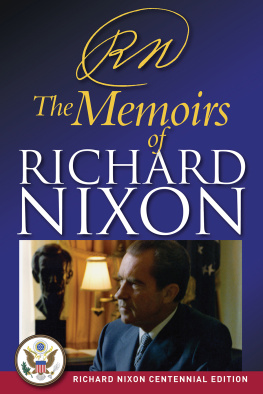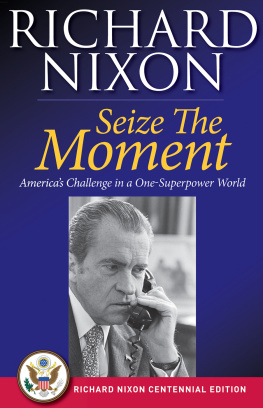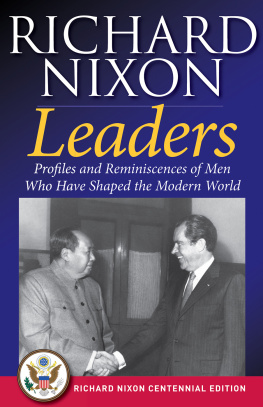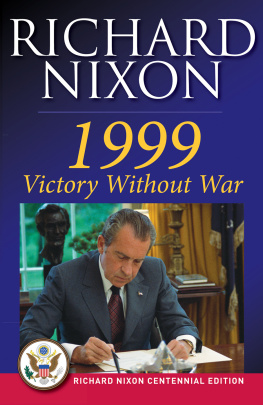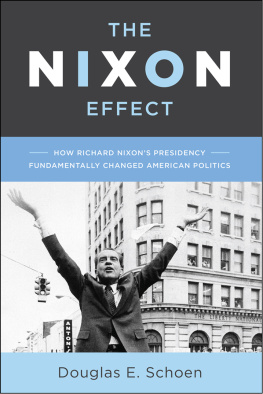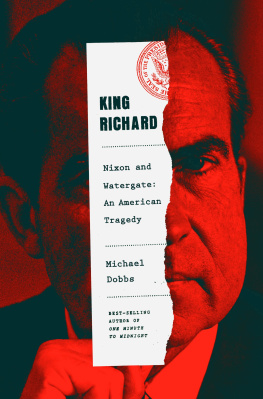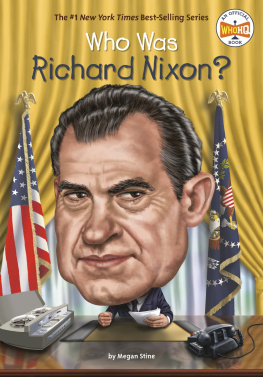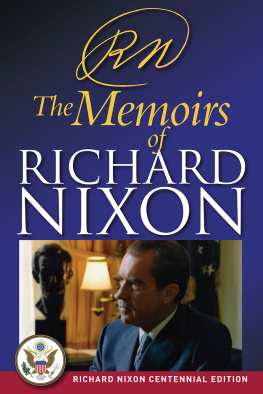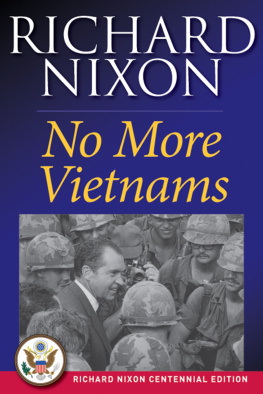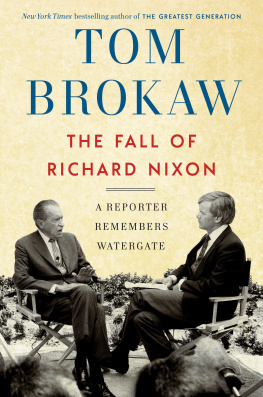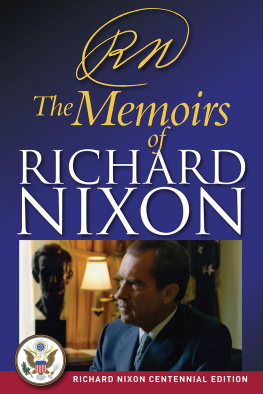Richard Nixon - The Memoirs of Richard Nixon
Here you can read online Richard Nixon - The Memoirs of Richard Nixon full text of the book (entire story) in english for free. Download pdf and epub, get meaning, cover and reviews about this ebook. year: 1978, publisher: Simon & Schuster, genre: Non-fiction. Description of the work, (preface) as well as reviews are available. Best literature library LitArk.com created for fans of good reading and offers a wide selection of genres:
Romance novel
Science fiction
Adventure
Detective
Science
History
Home and family
Prose
Art
Politics
Computer
Non-fiction
Religion
Business
Children
Humor
Choose a favorite category and find really read worthwhile books. Enjoy immersion in the world of imagination, feel the emotions of the characters or learn something new for yourself, make an fascinating discovery.
- Book:The Memoirs of Richard Nixon
- Author:
- Publisher:Simon & Schuster
- Genre:
- Year:1978
- Rating:4 / 5
- Favourites:Add to favourites
- Your mark:
- 80
- 1
- 2
- 3
- 4
- 5
The Memoirs of Richard Nixon: summary, description and annotation
We offer to read an annotation, description, summary or preface (depends on what the author of the book "The Memoirs of Richard Nixon" wrote himself). If you haven't found the necessary information about the book — write in the comments, we will try to find it.
The Memoirs of Richard Nixon — read online for free the complete book (whole text) full work
Below is the text of the book, divided by pages. System saving the place of the last page read, allows you to conveniently read the book "The Memoirs of Richard Nixon" online for free, without having to search again every time where you left off. Put a bookmark, and you can go to the page where you finished reading at any time.
Font size:
Interval:
Bookmark:
Thank you for purchasing this Simon & Schuster eBook.
Join our mailing list and get updates on new releases, deals, bonus content and other great books from Simon & Schuster.
C LICK H ERE T O S IGN U P
or visit us online to sign up at
eBookNews.SimonandSchuster.com

F OR
P AT , T RICIA, AND J ULIE
This is a memoira book of memories. Since memory is fallible and inevitably selective, I have tried whenever possible to check my recollections against the available records and to supplement them with contemporary sources. Some of these sourcesmemos, correspondence, public papersare self-evident. A few of them need further elaboration.
Throughout my public career I have had the habit of making extensive handwritten notes about my ideas, conversations, activities, and speeches. These notes, most of them made on yellow legal pads, total more than 20,000 pages extending from my outlines for the debates in the 1946 campaign to the outlines of my resignation speech in 1974. They range from offhand observations to extremely detailed passages of dialogue.
Between 1954 and 1957, while I was Vice President, I made diary-type dictations covering 112 different meetings, conversations, or events. I cannot remember why I started or why I stopped making them, and they cover such a wide variety of subjects and personalities that there does not seem to have been any single purpose behind them. These diaries, which were dictated on Edison Voicewriter platters, were transcribed in 1961 when I wrote Six Crises, but I did not use them directly in that book and they are quoted here for the first time.
By historical necessity some of the events in the pre-presidential years that were treated in Six Crises are also dealt with in this book. The reader will find, however, that while the facts concerning the events have not changed, the passage of time has enabled me to analyze them with greater perspective, and the new context has made it necessary for me to treat them in a substantially different and more condensed manner than they were treated in that earlier account.
During the presidency, from November 1971 until April 1973 and again in June and July 1974, I kept an almost daily dictated diary. In this book these passages are introduced by the heading Diary. With the exception of a few that were subpoenaed by the Watergate Special Prosecutor, none of these diary cassettes was transcribed until the summer of 1976 in San Clemente. While I have excerpted the passages from them that appear in this book, no word has been changed without adding brackets to indicate the change. These dictated diaries do not have the orderliness of a written diaryoften I would dictate on a subject one day and then expand on the same subject a day or two later. Because of this, in some cases, I have combined entries that deal with the same subjects but were dictated on different days. Diary entries dealing with Watergate, however, are always from the same dictating session on the same day.
For the Watergate period I have used some of the tape transcripts that are already public or that were used by the Special Prosecutor in different investigations and trials. In an effort to reconstruct as completely as possible what I knew and what I did in the crucial period immediately following the Watergate break-in, I asked Mrs. Marjorie Acker, a member of my staff since the vice presidential years, to type transcripts as well of the tapes of every conversation I had with H. R. Haldeman, John Ehrlichman, and Charles Colson for the month after my return to Washington following the break-in, June 20July 20, 1972. I asked her to do the same for my conversations with Haldeman in May 1973, when we were discussing what we remembered of the events of June 23, 1972, when I authorized the meeting in which the CIA was asked to limit the FBIs investigation of Watergate.
There were many unintelligible passages on these new tapes. Even so, I believe that they have enabled me to give the most complete account of those days that has ever been given.
In this book I recount many conversations, some of them as direct quotes. Those dealing with Watergate are largely based on the language recorded on the White House tapes. Others are based on my handwritten notes or my dictated diaries. There are also extensive memoranda of conversationsmemconscovering most talks with foreign leaders, and I have been able to use these to confirm and supplement my notes and recollections. Conversations in which I did not take part are obviously dependent upon reports from the participants or on secondary sources. In a few cases, I have had to depend solely upon my memory of a conversation in re-creating it, but I have tried to limit this to exchanges in which the vividness of the words lodged them unforgettably in my mind.
This book could not have been written or published without the help of dozens of people, and I am deeply grateful to all of them.
The wonderful volunteer women who work every day taking care of the mail that comes into La Casa Pacifica spent many hours on the laborious but important proofreading of three drafts of the manuscript.
Cathy Price, Marnie Pavlick, Nora Kelly, Cindy Serrano-Mesa, and Meredith Johnson worked late hours and many weekends in order to type the manuscript and then proof galleys against original documents. Judy Johnson helped with a variety of typing and research tasks; Meredith Khachigian helped to proof the manuscript against the originals of my diary. When all the papers of my administration were impounded, Howard W. Smith, a private citizen, kindly sent us his complete set of the daily press office news releases and special briefing transcripts.
Robert Huberty and Mark Jacobsen, of the University of California, Irvine, did much of the detailed library research and newspaper checking.
In a work of this size the copy editors perform an enormous and vital task. I want to thank David C. Frost and Nancy Brooks of Grosset & Dunlap for their patience, diligence, and professional expertise. Others who assisted in various tasks were Jack Brennan, Bernard Shir-Cliff, Larry Gadd, Diana Price, and Robert and Cara Ackerman. The index was compiled by Robert Daugherty, and the photographs were assembled with the help of Ann Grier. I also appreciate the interest and encouragement I have received from my publishers: Harold Roth and Bob Markel of Grosset & Dunlap and Bill Sarnoff and Howard Kaminsky of Warner Books.
I am grateful to the dozens of former staff members and friends who took part in the events chronicled in this book and who gave hours of time to me and my staff as we worked to reconstruct those events fairly and accurately. I am also grateful to those who read different parts of the manuscript and gave valuable advice and assistance: General Brent Scowcroft, who concentrated on the sections dealing with international affairs and foreign policy; Ray Price, who gave editorial assistance and advice, particularly on the domestic policy sections of the presidency; and Herb Stein, who provided editorial assistance on the section dealing with the economy.
Rose Mary Woods was able to spend several months in San Clemente sharing her memories of the twenty-three years during which she served as my personal secretary and applying painstaking attention to detail in reading and checking the manuscript. Marje Acker also came out to help with these tasks. Loie Gaunt, who first joined my staff when I was in the Senate, has served tirelessly as a limitless source of information and help throughout the past three years.
Finally, there are the three people who have worked with me on this project from the beginning. My deep gratitude goes to Ken Khachigian and Diane Sawyer for their research and for pulling together much of the source material. And to Frank Gannon, my chief editorial assistant who organized the research and directed the project, my special appreciation.
Next pageFont size:
Interval:
Bookmark:
Similar books «The Memoirs of Richard Nixon»
Look at similar books to The Memoirs of Richard Nixon. We have selected literature similar in name and meaning in the hope of providing readers with more options to find new, interesting, not yet read works.
Discussion, reviews of the book The Memoirs of Richard Nixon and just readers' own opinions. Leave your comments, write what you think about the work, its meaning or the main characters. Specify what exactly you liked and what you didn't like, and why you think so.

